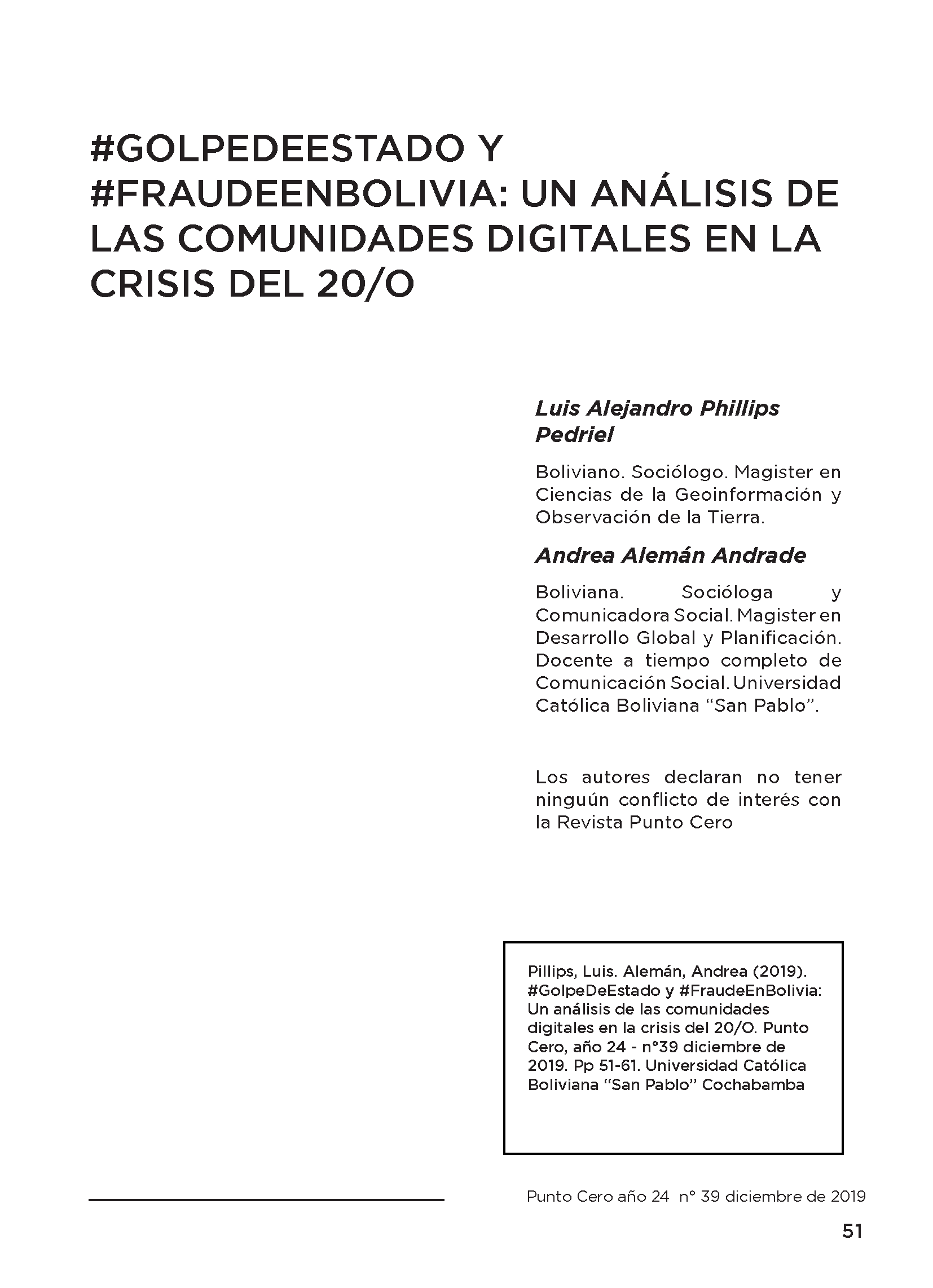#Golpedeestado and #Fraudeenbolivia: An analysis of digital communities 20/O crisis.
DOI:
https://doi.org/10.35319/puntocero.20193923Keywords:
Bolivia, Twitter, Digital Communities, DemocracyAbstract
The article has the objective to understand the conformation of the digital communities around the hastags #GolpeDeEstado (coup) and #FraudeEnBolivia (electoral fraud in Bolivia) in the Twitter during Bolivian crisis of October 20th (from the 10th to the 12th of November, 2019). A quantitative methodology was applied based on the digital networks analysis and semantic networks. The article gives graphics about the composition of the digital communities through the actor’s networks, trends analysis and semantic networks. In the case of #GolpeDeEstado, the articulation of the community has as centre @ evoespueblo, official account in Twitter of the former Bolivian President Evo Morales Ayma. On the other hand, #FraudeEnBolivia has a random shape based on communities that comes from Bolivian civil society. Both hashtags present a political dispute in an international level that opens the possibility to revalue the democratic participation reach.
References
Beguerisse-Díaz, Mariano, Garduño-Hernández, Guillermo, Vangelov, Borislav, Yaliraki, Sophia, Barahona, Mauricio (2014) Interest communities and flow roles in directed networks: the Twitter network of the UK riots. Journal the Royal Society Interface, 11(101). Pp. 1-12. Londres. DOI: https://doi.org/10.1098/rsif.2014.0940
CNN Español (14 de noviembre de 2019) ¿Quién apoya a Evo Morales? Estos son los gobiernos que lo respaldan (y los que no) https://cnnespanol.cnn.com/2019/11/11/quien-apoya-a-evo-morales-estos-sonlos-gobiernos-que-lo-respaldan-y-losque-no/ (28/11/2019)
De Nooy, Wouter, Mrvar, Andrej, Batagel J, Vladimir (2018) Exploratory Social Network Analysis with Pajek (3ra Edición) Cambridge University Press. DOI: https://doi.org/10.1017/9781108565691
El País (12 de noviembre de 2019) México otorga asilo político a Evo Morales. https://elpais.com/internacional/2019/11/11/actualidad/1573504978_938761.html (01/12/2019)
Guerrero, Noemí (2016). Grados de conversación y recursos de interacción comunicativa en Twitter. Textos en proceso 2(1) pp. 145-161. DOI: https://doi.org/10.17710/tep.2016.2.1.7neguerrerocontreras
Infobae (10 de noviembre de 2019) Alberto Fernández apoyó a Evo Morales: “En Bolivia se ha consumado un golpe de Estado” https://www.infobae.com/politica/2019/11/10/alberto-fernandez-apoyo-a-evo-morales-en-bolivia-se-ha-consumado-un-golpe-de-estado/ (01/12/2019)
La Razón Digital Bolivia (2019). Morales llama al diálogo. https://www.youtube.com/watch?v=a45P715DV7E (14/11/2019).
Latour, Bruno, (2008). Reensamblar lo social: una introducción a la teoría del actor-red. Buenos Aires.Manantial.
Millaleo, Salvador y Cárcamo, Pablo (2014). Medios sociales y activismo digital en el mundo. Santiago de Chile. FD+D. IDRC. ONG Derechos Digitales.
Morales, Evo (2019). Posts de Twitter. https://twitter.com/evoespueblo. (5/12/2019).
OEA (2019) Análisis de integridad electoral. Elecciones generales en el Estado Plurinacional de Bolivia, 20 de octubre de 2019. Hallazgos preliminares. http://www.oas.org/documents/spa/press/Informe-Auditoria-Bolivia-2019.pdf (28/11/2019)
Opinión (22 de octubre de 2019). Cabildo de Cochabamba determina paro indefinido a partir de mañana. https://www.opinion.com.bo/articulo/escenario-politico/cabildo-cochabamba-determina-paro-indefinido-partir-manana/20191022204452733490.html. (14/11/2019).
Opinión (07 de noviembre de 2019b). Policía indaga de oficio la muerte de Limbert Guzmán.https://www.opinion.com.bo/articulo/pais/policia-indaga-oficio-muerte-limbert-guzman/20191107153759735888.html. (14/11/2019).
Opinión (07 de noviembre de 2019c). Grupo retiene y humilla a la Alcaldesa de Vinto. https://www.opinion.com.bo/articulo/cochabamba/grupo-retiene-humilla-alcaldesa-vinto/20191107030817735801.html. (14/11/2019).
RT En Vivo (2019). Consejo permanente de la OEA considera la situación en Bolivia. https://www.youtube.com/watch?v=gaF6zaDW-U8. (14/11/2019).
Vera-Noriega, José Ángel y otros (2005). Redes semánticas: Aspectos teóricos, técnicos, metodológicos y analíticos. Ra Ximhai. 1(3): 439-451. México. DOI: https://doi.org/10.35197/rx.01.03.2005.01.JV

Downloads
Published
How to Cite
Issue
Section
License
Copyright (c) 2019 Revista Punto Cero

This work is licensed under a Creative Commons Attribution-NonCommercial 4.0 International License.








